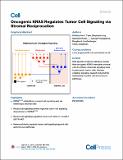| dc.contributor.author | Ling, Stephanie | |
| dc.contributor.author | Dimitriadi, Maria | |
| dc.contributor.author | McMahon, Kelly M. | |
| dc.contributor.author | Worboys, Jonathan D. | |
| dc.contributor.author | Leong, Hui Sun | |
| dc.contributor.author | Norrie, Ida C. | |
| dc.contributor.author | Miller, Crispin J. | |
| dc.contributor.author | Poulogiannis, George | |
| dc.contributor.author | Jørgensen, Claus | |
| dc.contributor.author | Tape, Christopher | |
| dc.contributor.author | Lauffenburger, Douglas A | |
| dc.date.accessioned | 2017-03-22T20:08:18Z | |
| dc.date.available | 2017-03-22T20:08:18Z | |
| dc.date.issued | 2016-04 | |
| dc.date.submitted | 2016-02 | |
| dc.identifier.issn | 0092-8674 | |
| dc.identifier.uri | http://hdl.handle.net/1721.1/107657 | |
| dc.description.abstract | Oncogenic mutations regulate signaling within both tumor cells and adjacent stromal cells. Here, we show that oncogenic KRAS (KRAS[superscript G12D]) also regulates tumor cell signaling via stromal cells. By combining cell-specific proteome labeling with multivariate phosphoproteomics, we analyzed heterocellular KRAS[superscript G12D] signaling in pancreatic ductal adenocarcinoma (PDA) cells. Tumor cell KRAS[superscript G12D] engages heterotypic fibroblasts, which subsequently instigate reciprocal signaling in the tumor cells. Reciprocal signaling employs additional kinases and doubles the number of regulated signaling nodes from cell-autonomous KRAS[superscript G12D]. Consequently, reciprocal KRAS[superscript G12D] produces a tumor cell phosphoproteome and total proteome that is distinct from cell-autonomous KRAS[superscript G12D] alone. Reciprocal signaling regulates tumor cell proliferation and apoptosis and increases mitochondrial capacity via an IGF1R/AXL-AKT axis. These results demonstrate that oncogene signaling should be viewed as a heterocellular process and that our existing cell-autonomous perspective underrepresents the extent of oncogene signaling in cancer. | en_US |
| dc.description.sponsorship | Wellcome Trust (London, England) (Sir Henry Wellcome Fellowship 098847/Z/12/Z) | en_US |
| dc.description.sponsorship | National Institutes of Health (U.S.) (Grants U54-CA112967 and R01-CA96504) | en_US |
| dc.description.sponsorship | Rosetrees Trust (M286) | en_US |
| dc.language.iso | en_US | |
| dc.publisher | Elsevier | en_US |
| dc.relation.isversionof | http://dx.doi.org/10.1016/j.cell.2016.03.029 | en_US |
| dc.rights | Creative Commons Attribution 4.0 International License | en_US |
| dc.rights.uri | http://creativecommons.org/licenses/by/4.0/ | en_US |
| dc.source | Elsevier | en_US |
| dc.title | Oncogenic KRAS Regulates Tumor Cell Signaling via Stromal Reciprocation | en_US |
| dc.type | Article | en_US |
| dc.identifier.citation | Tape, Christopher J. et al. “Oncogenic KRAS Regulates Tumor Cell Signaling via Stromal Reciprocation.” Cell 165.4 (2016): 910–920. | en_US |
| dc.contributor.department | Massachusetts Institute of Technology. Department of Biological Engineering | en_US |
| dc.contributor.mitauthor | Tape, Christopher | |
| dc.contributor.mitauthor | Lauffenburger, Douglas A | |
| dc.relation.journal | Cell | en_US |
| dc.eprint.version | Final published version | en_US |
| dc.type.uri | http://purl.org/eprint/type/JournalArticle | en_US |
| eprint.status | http://purl.org/eprint/status/PeerReviewed | en_US |
| dspace.orderedauthors | Tape, Christopher J.; Ling, Stephanie; Dimitriadi, Maria; McMahon, Kelly M.; Worboys, Jonathan D.; Leong, Hui Sun; Norrie, Ida C.; Miller, Crispin J.; Poulogiannis, George; Lauffenburger, Douglas A.; Jørgensen, Claus | en_US |
| dspace.embargo.terms | N | en_US |
| dc.identifier.orcid | https://orcid.org/0000-0001-7004-8227 | |
| mit.license | PUBLISHER_CC | en_US |
| mit.metadata.status | Complete | |
